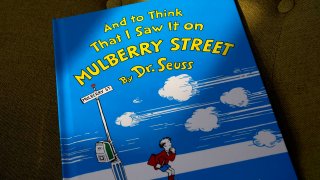Depictions of characters with stereotypical imagery have resulted in six Dr. Seuss books no longer being published, the business that preserves and protects the author's legacy said Tuesday.
“These books portray people in ways that are hurtful and wrong,” Dr. Seuss Enterprises said in a statement that coincided with the late author and illustrator’s birthday.
“Ceasing sales of these books is only part of our commitment and our broader plan to ensure Dr. Seuss Enterprises’ catalog represents and supports all communities and families," it said.
The books affected are — “And to Think That I Saw It on Mulberry Street, ” “If I Ran the Zoo,” “McElligot’s Pool,” “On Beyond Zebra!,” “Scrambled Eggs Super!,” and “The Cat’s Quizzer.”
“Dr. Seuss Enterprises listened and took feedback from our audiences including teachers, academics and specialists in the field as part of our review process. We then worked with a panel of experts, including educators, to review our catalog of titles," it said.
More From NBCLX
The ‘Deeply Sexist' Joke About Her Love Life That Has Taylor Swift (And Her Fans) Fuming Mad at Netflix
Seth Rogen Is Now Selling His Favorite Weed in America — Here's How to Find It
"And to Think That I Saw It on Mulberry Street," came under scrutiny in 2017 when a Western Massachusetts museum dedicated to Dr. Seuss said it would replace a mural featuring a Chinese character from the book after three authors threatened to boycott an exhibit due to the "jarring racial stereotype."
The authors — Mike Curato, Mo Willems and Lisa Yee — explained their position on the image in a letter posted to Facebook, saying "the selected art is a jarring racial stereotype of a Chinese man, who is depicted with chopsticks, a pointed hat, and slanted slit eyes."
The statement continued, "While the image may have been considered amusing to some when it was published 80 years ago, it is obviously offensive in 2017 ... Displaying imagery this offensive damages not only Asian American children but also non-Asian kids who absorb this caricature and could associate it with all Asians or their Asian neighbors and classmates."
Books by Dr. Seuss — who was born Theodor Seuss Geisel in Springfield, Massachusetts, on March 2, 1904 — have been translated into dozens of languages as well as in braille and are sold in more than 100 countries.
The author died in 1991. But Dr. Seuss remains wildly popular, earning an estimated $33 million before taxes in 2020, up from just $9.5 million five years ago, the company said. Forbes listed him No. 2 on its highest-paid dead celebrities of 2020, behind only the late pop star Michael Jackson.
But as adored as Dr. Seuss is by millions around the world, there has been increasing criticism in recent years over the way Black, Asian and other characters are drawn in some of his children’s books, as well as in his earlier advertising and propaganda illustrations.
In 2017, a school librarian in Cambridge, Massachusetts, criticized a gift of 10 Seuss books from first lady Melania Trump, saying many of his works were “steeped in racist propaganda, caricatures, and harmful stereotypes.”


